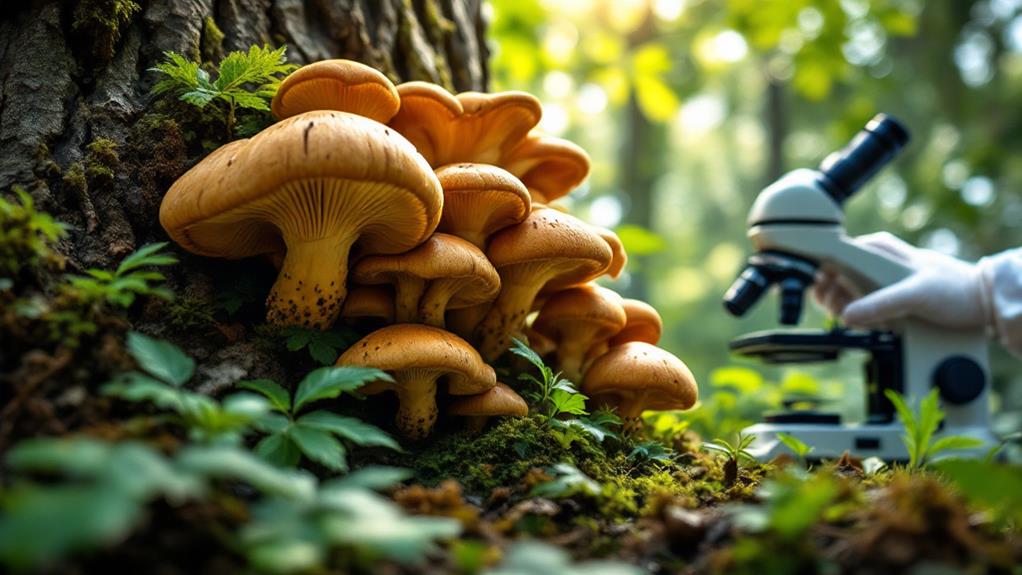Using Chaga Mushrooms to Treat Psoriasis: A Natural Remedy

If you're exploring natural ways to manage psoriasis, Chaga mushrooms can be a promising option. They're rich in anti-inflammatory compounds like betulinic acid, which may help reduce skin inflammation. The mushrooms' high antioxidant content offers protection against skin damage and helps combat oxidative stress. Furthermore, Chaga's beta-glucans improve immune function and may balance cytokine production, potentially suppressing psoriasis flare-ups. Start by consulting a healthcare provider, and try small doses of high-quality Chaga products. It's crucial to verify they meet safety standards and are organically certified. There's much more to uncover about integrating Chaga into your skincare routine.
Understanding Psoriasis
Psoriasis is a complex and chronic autoimmune condition affecting about 125 million people worldwide, or roughly 2-3% of the population. This condition is characterized by rapid skin cell growth, resulting in red, scaly patches on your skin. It's not just the appearance that psoriasis affects; it comes with systemic inflammation that can lead to other health issues. You might find that psoriasis is triggered by a mix of genetic predisposition and environmental factors, with an overactive immune response playing a significant role. This immune response causes inflammation and leads to the rapid proliferation of skin cells.
Understanding the triggers is vital in managing this chronic disease. Stress, infections, injuries, certain medications, smoking, and alcohol consumption can all provoke flare-ups, showcasing the multifaceted nature of psoriasis. It's significant to recognize these triggers to help minimize the impact on your life. While conventional treatments are available, some people turn to natural remedies, like Chaga mushrooms, for potential relief. These remedies aim to address the underlying inflammation and immune system issues. By understanding psoriasis, you're better equipped to investigate diverse management strategies and potentially improve your quality of life.
Benefits of Chaga Mushrooms
While exploring natural remedies for psoriasis, you might come across Chaga mushrooms, known for their impressive anti-inflammatory properties. These mushrooms, scientifically called Inonotus obliquus, are rich in betulinic acid, a compound that can suppress inflammatory responses often linked to psoriasis. By addressing inflammation, Chaga mushrooms may help alleviate the skin-related symptoms you experience.
The antioxidant properties of Chaga are another reason to take into account this natural remedy. High in antioxidants, Chaga combats oxidative stress, which contributes to skin damage and inflammation seen in psoriasis. Incorporating Chaga into your routine may help protect your skin from further harm.
Chaga mushrooms also contain beta-glucans, which are known to improve immune system function. This enhancement can promote a balanced immune response, vital for those with autoimmune conditions like psoriasis. By regulating cytokine production, Chaga helps control inflammation and immune responses, processes often dysregulated in psoriasis.
In traditional medicine, Chaga has been used for treating skin ailments, highlighting its historical significance and potential effectiveness. By leveraging Chaga's benefits, you might find a supportive approach to managing psoriasis symptoms naturally.
Scientific Evidence and Studies

Scientific studies provide insights into the potential of Chaga mushrooms for managing psoriasis. Research indicates that these mushrooms might offer anti-inflammatory properties and antioxidant benefits, which are essential in addressing skin inflammation. For instance, the work of Dosychev & Bystrova (1973) and Liu et al. (2019) highlights betulinic acid, a compound in Chaga, as a suppressor of the Th17 immune response linked to psoriasis. This suppression could alleviate inflammation and potentially improve psoriasis symptoms.
- A study in the Journal of Ethnopharmacology demonstrated that Chaga extracts could reduce skin inflammation in lab models, suggesting potential health benefits for psoriasis sufferers.
- Chaga mushrooms are rich in antioxidants like polyphenols and melanin, which may protect skin cells from oxidative stress during psoriasis flare-ups.
- Observations from traditional medicine show alignment with Chaga's use in easing psoriasis symptoms, particularly in cultures familiar with its therapeutic properties.
Despite these promising findings, it's vital to recognize that large-scale human clinical trials are still necessary. These trials would validate Chaga's efficacy and help establish safe usage guidelines. Until then, Chaga mushrooms remain an intriguing aspect of psoriasis research.
Safe Consumption Practices
Before you start incorporating Chaga mushrooms into your routine, it is vital to guarantee safe consumption practices. Initially, consult with a healthcare professional to evaluate any potential interactions, especially if you're on medications like anticoagulants or diabetes drugs. This step safeguards your safety and helps prevent any adverse effects.
When choosing Chaga products, prioritize high-quality options that are certified organic and free from contaminants. Look for those that have been third-party tested to confirm their safety and efficacy. Starting with a low dosage is key; a gradual increase allows you to monitor your body's response and identify any adverse reactions or digestive issues early on.
Popular methods for consuming Chaga include brewing Chaga tea, using powdered extracts in smoothies, or taking capsules. Make sure you follow proper preparation techniques to extract the beneficial compounds effectively. As you incorporate Chaga into your regimen, keep a close eye on how your body reacts. If you experience any allergic reactions or digestive discomfort, discontinue use immediately and inform your healthcare provider about your Chaga consumption. This approach guarantees you harness the benefits of Chaga mushrooms safely and effectively.
Additional Natural Remedies

In exploring supplementary natural remedies for psoriasis, you'll find several options that can complement traditional treatments. While Chaga mushrooms are renowned for their antioxidant properties, helping to reduce inflammation and benefiting diverse skin conditions, there are other natural remedies worth considering. Aloe Vera, known for its soothing abilities, can be applied directly to the skin to alleviate redness and irritation from psoriasis symptoms. Omega-3 fatty acids, present in fish oil and flaxseed, offer anti-inflammatory properties that may help reduce the production of inflammatory compounds in your body, thereby improving psoriasis.
- Aloe Vera: Soothes skin, reduces redness and irritation.
- Omega-3 Fatty Acids: Found in fish oil and flaxseed, these reduce inflammation.
- Turmeric: Contains curcumin with antioxidant and anti-inflammatory properties.
Additionally, turmeric, with its potent anti-inflammatory and antioxidant properties, can be taken as a supplement or applied as a topical agent to possibly improve skin health. Probiotics might support your immune system by promoting gut health, potentially reducing gut inflammation and psoriasis flare-ups. Tea Tree Oil, another medicinal option, possesses antiseptic and anti-inflammatory properties, which may improve the appearance of psoriatic lesions, making it a valuable natural remedy alongside Chaga mushrooms.




